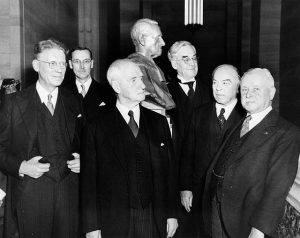Duff served as a member of the Supreme Court of Canada for a record 38 years, 11 of them as Chief Justice. He retired at age 79, having had his term as Chief Justice extended twice.

Duff rented a large house at 488 Wilbrod Ave. for ten years between 1935 or 6 and 1946 when he was Chief Justice (1933 – 1944) and lived here with his sister Annie (Sir Lyman was a widower). Earlier, he had lived at 30 Goulburn Ave.
He presided over the Supreme Court when it became Canada’s final court of record in 1939 and appeals to Britain were ended. He was the first Canadian to officially open the Parliament of Canada, standing in twice in 1931 and 1940 for governors general who had retired or died. His secretary remembers him as a “prodigious worker”, a good conversationalist, a man with a photographic memory and as a great lover of books. Bilingual, he read avidly, in both English and French, on a wide range of topics, including the law, science, history, religion, philosophy and detective stories. At the end of his career, his personal library was appraised at $25,000.
Beside being a Supreme Court judge, he also chaired a number of royal commissions and sat as a member of the Judicial Committee of the Privy Council in London on overseas, Dominion, and Colonial Appeals for some thirty years (with an intermission during World War 2).
Duff was but one of at least six chief justices of the Supreme Court who lived in Sandy Hill. The others were William Ritchie (240 Daly Ave.), Sir Elzéar Taschereau (Laurier Ave. E), Sir Charles Fitzpatrick (274 Daly Ave.), Thibodeau Rinfret (177 Wilbrod Ave.) and Antonio Lamer (Blackburn Ave.).
While Duff had a distinguished career as a jurist, he could just as well be remembered today for political reasons had events unfolded differently. In the summer of 1917, when Prime Minister Borden was wrestling with the deep national divisions created by the government’s decision to impose mandatory military service, he sought to create a coalition government with Laurier’s Liberals in order to unite the country. Borden was prepared to resign as part of the deal and he considered asking the Governor General to appoint Duff as interim prime minister (even though Duff had once been President of the Victoria Liberal Club). Opposition within his own party led him to abandon the idea and Borden remained in office three more years. Years later, in 1940, Mackenzie King confided to his Quebec Lieutenant Ernest Lapointe that he would have recommended Duff be named Governor General but desisted because Duff was not married at the time (he was a widower). King, of course, remained a bachelor all his life.
